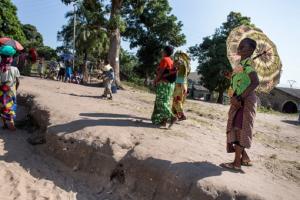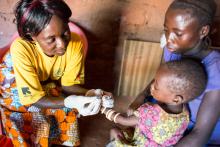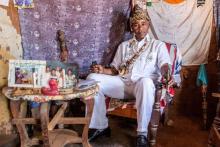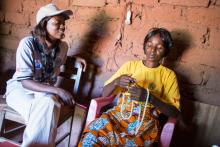WHO child health programme dries tears in the Democratic Republic of the Congo
13 July 2017 - Community health workers provide treatment and diagnosis of malaria, pneumonia and diarrhoea to children under 5 living in the Democratic Republic of the Congo’s rural Tanganyika Province, where travel to health centres is difficult.
The tears have stopped in Tanganyika Province. In one of the Democratic Republic of the Congo’s (DRC) newest provinces, the Rapid Access Expansion (RAcE) Programme has turned the table on a trio of maladies that cause 42% of deaths in children under the age of 5: malaria, pneumonia and diarrhoea. Agricultural workers returning from the fields to their communities say they no longer hear nightly mourning cries. Instead, children play raucously, passing the community health worker’s hut, taunting each other with tales of pin-pricks in case of misbehaviour.
Village leaders credit the contribution of community health workers, known as relais communautaires, who are the foundation of RAcE’s success in bringing desperately needed treatment for diseases that can kill young children rapidly.
"RAcE and the iCCM strategy are "the light that we were looking for to make our efforts strong. We have adopted this ‘magic’ to save our children; to cease our mourning".
Dr Kalume Tutu, Director of Family Health and Special Groups,
Ministry of Health
The people of Tanganyika Province live in remote areas where access to healthcare is challenging due to lack of transportation, natural and physical barriers, and poverty. Deeply-rutted mountainous dirt roads, thick with dust in the dry season and treacherously slippery in the half-yearly rainy season are difficult to navigate not only for people travelling by foot, but also for ‘taxis’ – bicycles and mopeds with passengers perched precariously on the backs.
Families are poor, subsisting on what they can eke from the fields, with little or no funds to spare on treatment in health centres. And there are other obstacles. In some cases, the only routes require passing through areas with wild animals like leopards or lions, or through crocodile-infested rivers.
Diagnosis, treatment and referral in the community
Against this backdrop, malaria, pneumonia and diarrhoea have taken a heavy toll against highly vulnerable children under 5, who can die if not treated. In 2012, Global Affairs Canada provided a generous grant to WHO to create RAcE, a programme that works with the Ministry of Public Health to bring treatment into remote villages through a strategy known as integrated community case management.
Volunteers like 42-year-old Pascaline are selected by the community to undergo training so that they can correctly diagnose and treat local children, referring those who are gravely ill to a health centre. Welcoming a young mother with a smile as warm as the equatorial sunshine beating down on her straw-roofed hut, Pascaline diagnoses feverish 18-month-old Elessa using a step-by-step checklist and simple tools like a tape that identifies malnutrition and a rapid diagnostic test for malaria. She administers the first dose of artemisinin-based combination therapy (ACT) tablets, counselling Elessa’s mother on timing and dosage for the remainder of treatment, using a mosquito net, and arranging a follow-up visit.
These high quality medicines are saving children. Each successful treatment leads communities away from dangerous traditional healing methods including purging, handmade remedies, sorcery and purchasing cheap and non-effective medicines from roadside pharmacies. Since her village has welcomed an additional 3900 people fleeing conflict in northern DRC, Pascaline sees 50 to 60 children each month, up to double her earlier number.
Pascaline is providing an invaluable service to her community. Her children and husband help with household tasks or picking up her supplies of medicines, diagnostic tests and latex gloves. Chief Gérard Kalunga, the head of Kalunga village, selected Pascaline as part of his responsibility to protect and care for his burgeoning community, perched on a mountain above distant Lake Tanganyika.
Team spirit
Together with Nigeria, DRC carries 40% of the global malaria burden, both in number of cases and number of deaths. Tanganyika’s family and public health practitioners and the provincial ministry actively support RAcE through designated focal points. The International Rescue Committee (IRC), a non-governmental organization that already was working on community programmes and mother-child health initiatives in Tanganyika Province, was selected to support the Provincial Ministry of Public Health.






